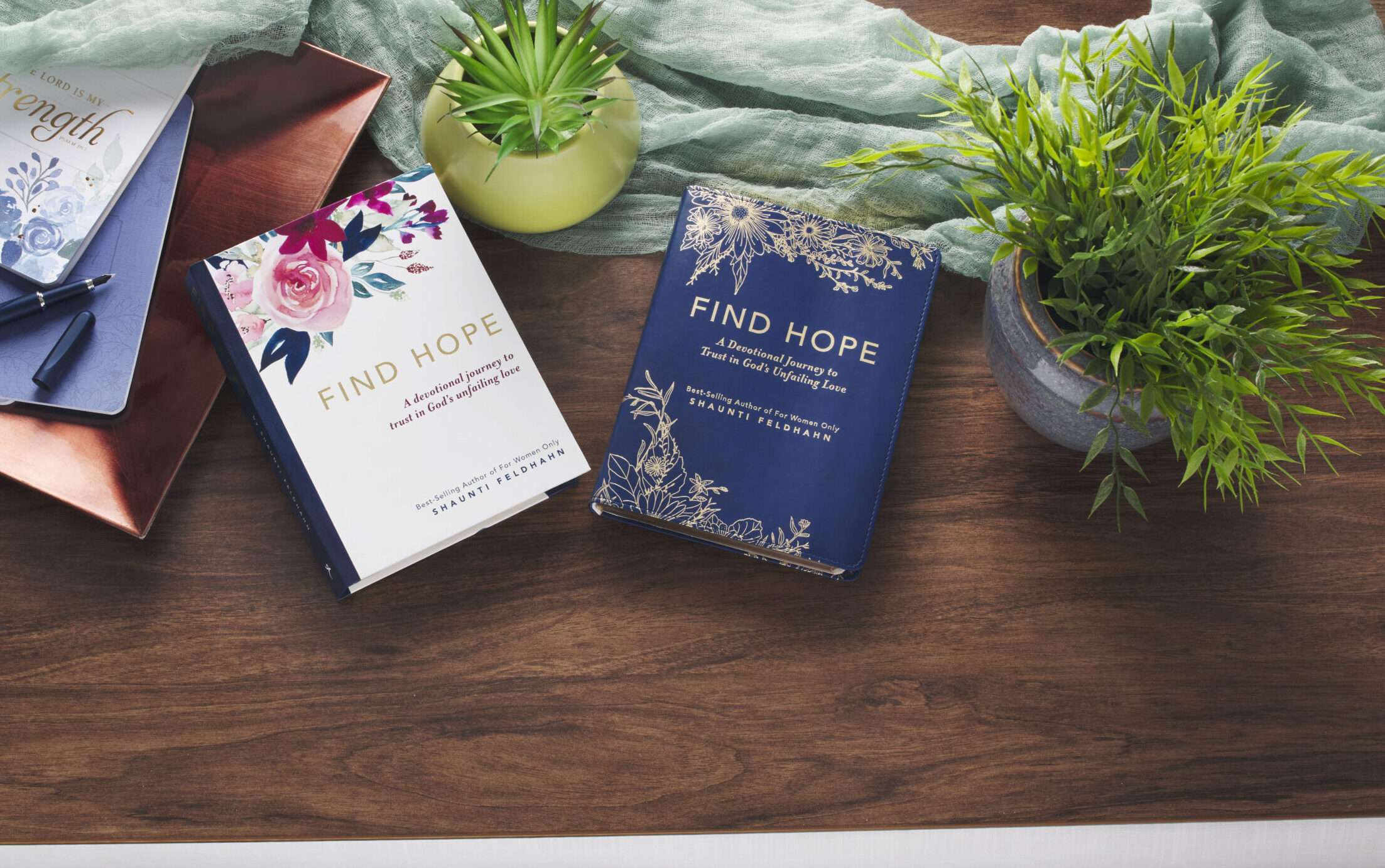How to Live With Unshakeable Hope
You and I were made to live with rock-solid hope. But when we’re in pain or discouraged, hope can feel far away just when we need it most, right?
That’s why I’ve released a brand-new 60-day devotional, Find Hope. This is a book straight from my research-loving heart, and I’ve been waiting for Easter week – the most hope-filled time on the calendar for Christians – to tell you about it. Because we need to know that we can build a rock-solid hope that never feels far away!
Here’s the problem we most need to overcome: We are settling for the wrong kind of hope. We often use the word “hope” like this:
- I hope I get the grade I need to pass.
- I hope the cancer doesn’t return.
- I hope my job doesn’t get downsized.
These hopes (while totally valid) are actually synonymous with worries. I hope I get a passing grade … but I’m worried I won’t. This is little-h hope – and it can’t keep us going. Why? Because it hinges on one particular outcome.
God wants us to have a sense of hope even if we don’t get the outcome we want! This is Hope with a capital H. It is God’s fuel for our lives, and it is available to you and me.
I can almost hear the next question. How do I find that kind of hope?
I searched scripture and science for answers to this question, and I’ve compiled what I found into my brand new 60-day devotional Find Hope. Its pages combine Biblical wisdom and inspiration with practical, doable habits that cultivate Capital-H Hope – the kind that sustains us through hard times and in dark places.
Here’s a sneak peek into three of the book’s ten hope-building habits.
Hope-building habit #1: Choose trust
Trust in God often isn’t a feeling, it’s a choice. Anyone can get there … but it requires taking two big steps of faith. First, it requires accepting that God is fully good, compassionate, and loving. And then it requires handing over the reins of our life to His good care. Hope entirely hinges on choosing to trust in Him.
I know readers of this blog are in different places spiritually. But intellectually, I would suggest that without trust in a sovereign God who loves you and is in charge of your life, it’s impossible to have Capital-H Hope. Likewise, if you do have total trust in God, it’s impossible not to have that Hope.
A story I recounted in Find Hope about my friend Sofia brought this to light for me in a profound way. A mystery junkie as a kid, Sofia ended up in adulthood with an unsolved mystery of her own: a medical condition that multiple medical doctors could not diagnose. Finally, she came to this conclusion:
“I had to accept that this was just a mystery that God did not have to solve for me. He owed me nothing. Instead, He invited me into the mystery of His sovereignty. He beckoned me to trust Him more with what He didn’t reveal, as opposed to what He could reveal … I learned to trust His heart when I couldn’t trace His hand.”
I still catch my breath at the depth of her words. God’s heart can be trusted even when we can’t make sense of the plan.
Why? Because He loves us.
His love came here. He is an ever-present help here. He parted the Red Sea, caused Jericho’s walls to fall, and conquered death here. This is what allowed David to say, “I will see the goodness of the LORD in the land of the living” (Psalm27:13 NIV) rather than waiting for an as-yet undefined view of goodness in heaven.
When we choose to trust God’s heart, Hope comes alive.
Hope-building habit #2: Embrace humility
There’s a moving scene in the movie The Jesus Revolution, where Pastor Chuck Smith (played by Kelsey Grammar) responds to a church member who complains about hippies staining the church’s new shag carpet with their dirty bare feet. The next Sunday, Smith greets the hippies with a wash rag and a smile, washing their dirty feet one by one and welcoming them into fellowship.
Our culture doesn’t prize power bending low. And yet, Jesus – the One with all authority – was the original foot washer. Once, while eating a meal in the home of a religious leader, He watched guests claim the best seats at the table and had this to say:
“For all those who exalt themselves will be humbled, and those who humble themselves
will be exalted.” (Luke 14:11 NIV)
Science also offers a glimpse into humility’s benefits. One group of researchers suggested that humility is to relationships what oil is to an engine – it prevents relational breakdown. Humility, they concluded, buffers the wear-and-tear that a spirit of competition has on relationships.
How does all of this attach to hope?
A rich Hope is birthed when we have the humility to lay down our deepest, most desperate desires. For example, when we have the humility to be okay with not having things our way,not attacking back on social media, or not receiving accolades for a good deed.
Whether it’s our desired social standing, a job promotion, the “right” health, or our kid winning all the trophies, when we release our white-knuckle grip on the outcome we want and live humbly surrendered to what God knows we need, Hope enters.
This isn’t to say that jobs, health, and our kids aren’t worthy of persistent prayer. They are! But remember, Capital-H Hope doesn’t hinge on any one outcome.
Capital-H Hope surrenders to the realization that God is God, and we are not.
Hope-building habit #3: Live in community
This is one of those ultra-practical habits that we have to grapple with. If we are going to find Hope in the midst of any challenge, it will often come through fellowship within the family of God. In fact, there is almost no way to find Hope without community!
Our calendars are a great glimpse into our priorities. Are we leaving time to be involved in the lives of other believers? Or are we Lone Rangering it – and not leaving margin in our calendars or hearts to connect in meaningful community? If we’re going it alone, both scripture and science show us a better way.
When God created man, He declared that it was “not good” for man to be alone. He gave Adam a companion. And then God walked with them in the garden. It was the first “small group!”
For decades, scientific research has linked social isolation to greater risk of heart attack, depression and anxiety, dementia, and even earlier death – and linked social connectedness to better health and longer life.
No matter our personality type, every one of us is created for belonging; we are made to feel connected to others. Yet some of us become lonely and isolated, as busyness and self-sufficiency creep in. These insidious Hope-stealers gobble up our schedule and our dependence on God. Before we know it, we feel pretty discouraged.
Here are four practical ideas for connection:
- Each day, text someone to see how they are doing, or reach out by a good, old-fashioned phone call. The ten minutes in the car will do just fine!
- Join a group or take a local in-person class, if that activity will allow you to interact with people. (Tennis, anyone?)
- Volunteer at church and become part of the community of those who work with youth or are on the greeting team. (Research shows volunteering improves brain function and offers heart benefits, too!)
And most important, if you only have time to do one thing, do this:
- Join a small group at church. Scientifically, being in a regular community where you can build real, vulnerable friendships is usually the most impactful action.
Friends, Hope is something we can build. The pages of Find Hope contain practical devotions and question prompts to help you do it! In our 60-day journey, we’ll get to know Jesus more intentionally, discover how to cast out fear, and learn how to “do the work” of cultivating a Hope that not only transforms our lives – but also the lives of those around us.
I “hope” you’ll pick up a copy today.
If you are interested in having Shaunti bring research-based strategies, practical wisdom and biblical principles to your next event, please contact Nicole Owens at [email protected].
On our podcast, I Wish You Could Hear This, Jeff and I offer proven steps to help you thrive in your life, faith and relationships. In other words, we’ll offer the practical help you’ve grown accustomed to right here in this blog space. You’ll take away specific steps that help you today. Listen, follow, and share with your friends on YouTube, Apple Podcasts, Spotify and other platforms.
Please note: This post may contain affiliate links. As an Amazon Associate we earn a small amount from qualifying purchases through these affiliate links. This doesn’t cost you anything, and helps us continue bringing you great content!
More from Shaunti’s Blog:







